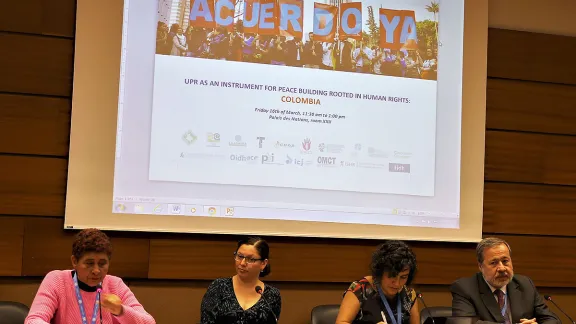
Members of the Colombian Commission of Jurists detail the situation in their country at a Human Rights Council side event on 16 March 2018. Photo: LWF/ Peter Kenny
LWF supports Colombian Commission of Jurists
(LWI) - Despite the peace agreement between the Colombian government and the main guerrilla group, human rights violations continue. A parallel report assembled by the Lutheran World Federation (LWF) and Colombian human rights organizations speaks of assassinations of human rights activists, corruption and a failure to guarantee basic human rights to the indigenous population, among others. Findings of the report were discussed in a side event at the Human Rights Council (HRC) on 16 March and presented in a public statement to the plenary today.
The report comes just before the Human Rights Council will review the human rights situation in Colombia in its fall session in September 2018. Before this Universal Periodic Review (UPR), civil society organizations such as the LWF are invited to present reports based on their work in the country which is to be examined. LWF has been working with communities in Arauca and Choco departments since 2002 and has actively supported the Colombian peace process.
Life in fear
Although a Final Peace Agreement was signed in Colombia in 2016, LWF partners agree that the situation is still precarious. “Paramilitary groups are not demobilized. They are still able to assassinate human rights defenders,” said Silvia Irene Berrocal, a community leader who has worked with the vulnerable sectors in Apartadó (Urabá, Antioquia) in Colombia. “It is so dangerous, I was forced to flee.”
The side event was chaired by Ana Maria Rodriguez, director for International Advocacy of the Colombian Commission of Jurists. Speakers included Gustavo Gallón Giraldo, director of the Colombian Commission of Jurists, and Jomary Ortegon Osorio, vice president of the Colectivo de Abogados José Alvear Restrepo, besides Berrocal.
Chairperson Rodriguez said there is a “huge number” of more than 200 recommendations in the UPR process such as how to deal with “extra-judicial impunity in violence against women.”
“Even as the peace process is going on, there are so many problems now,” Gallón, who has worked in different capacities as an Independent Expert for the HRC said. He cited problems with demilitarization as well as problems bringing about reforms in land distribution.
Advocate on all levels
The findings of the parallel report will be shared with national governments who then make recommendations to the country under review, putting international pressure on the Colombian government to act upon the recommendations. LWF however will not simply wait for change to happen, said Michael French, LWF Regional Program Coordinator for Latin America and the Caribbean, but support the process on local and national level in Colombia.
Getting governments to make promises in Geneva is just part of the process. The real focus is at the national and local level where we work with the authorities to ensure that real change is implemented.
“Getting governments to make promises in Geneva is just part of the process,” he said. “The real focus is at the national and local level where we work with the authorities to ensure that real change is implemented. That means defending the rights of local people so that – for example – they gain access to land, their children get an education, or the environment is protected.”
LWF partners such as the Colombian Commission of Jurists already have a roadmap of what needs to be done, and how international and national human rights defenders can work together.
“We have to boost the capacity of the State,” national director Gallón said. “We have to change the military doctrine. So, the part of the international community is essential, as is that of the office of the Human Rights High Commissioner,” who he said plays a key role in the Peace Agreement.
“We have to resort to normal justice to make perpetrators of human rights atrocities accountable,” he added, explaining that for lasting peace Colombia must engage in many structural changes, including, “guaranteeing a minimum of economic, social, and cultural rights,” to all groups of the population.
More stories
Colombian peace process


